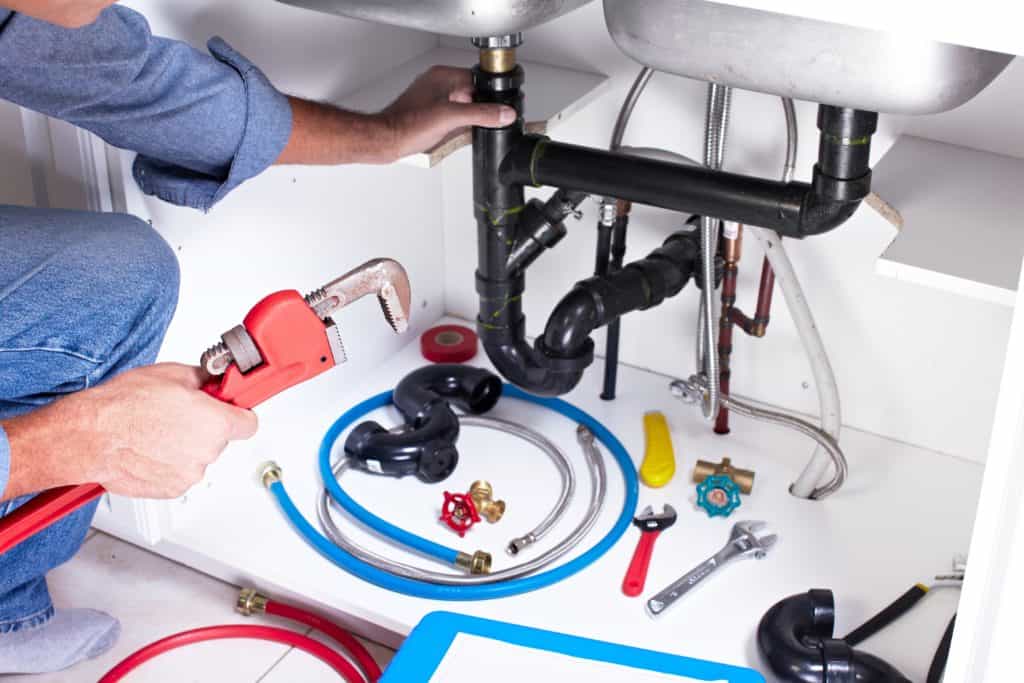
Statistics show that the need for white-collar workers is steadily decreasing. The need for plumbers and other home technicians is on the rise. For anyone seeking to launch a new business venture, plumbing is a viable option. The question is, how do you start a plumbing company? And then, how do you grow your business?
Table of Contents
It’s not something that will happen overnight. To grow your plumbing brand, it will require commitment. There’s certification to think about. There’s marketing. You will likely need to hire a team, as well.
In this post, we’ll walk you through the basics. Consider these 20 steps as you seek entry in the plumbing industry.
How to Grow Your Plumbing Business

1) Hone your skills.
Before you begin work as a plumber, you’ll need some real-world experience. You’ll only be successful if you are confident and capable in meeting clients’ needs.
The best place to begin is with some projects around the house. Get used to the basic tools and techniques. Familiarize yourself with different activities. These can include leak repair, fixture installation, and more.
Once you feel equipped to tackle bigger projects, seek an apprenticeship. Many states require an apprenticeship before licensing. Even if you don’t need an apprenticeship, it offers good experience. And, it helps you ensure that plumbing is what you really want to do.

2) Get certified as a plumber.
What does it mean to get certified as a plumber? The plumbing certification requirements vary by state. Almost all states require plumbers to be licensed. Doing so also helps you win the trust of your clients. And, it allows you to network and expand your small business.
Look into your state’s specific guidelines for getting licensed. This may require apprenticeship hours or time in the classroom. It likely requires you to sit for an exam. This exam is less about the technical aspects of plumbing. Instead, it focuses more on laws, codes, and regulations. Request study guides to prepare in advance.

3) Study the market.
How many plumbing companies are in your area? Which ones seem successful? What are their areas of focus? Are there underserved niches you could focus on? For example, is there an opening for a septic specialist? How about a plumber who focuses on small business needs?
Before launching your plumbing company, you need the lay of the land. Spend some time researching. For help, you can seek info from the Chamber of Commerce or BBB. Develop a sense of the local plumbing trade. And, look for a place where you can fit in.

4) Establish a business plan.
To launch a plumbing business, you’ll need a plan. A good business plan will encompass several key topics. These include:
- Your market positioning. How will you offer value to clients? What distinguishes your plumbing business?
- Your financial positioning. How will you pay for your start-up resources, equipment, etc.?
- An executive statement. What’s the mission of your plumbing company? What services will you provide? Who is your target clientele?
For examples of business plans, just do a quick Google search. This document can provide direction as you move forward.

5) Secure financing.
It’s difficult to launch a business without capital. To grow your business, you’ll need certain resources. Some examples include:
- Tools and supplies
- A truck or van
- Money for startup marketing
- Money for licensing fees
- Money to make payroll (if you start hiring right away)
All of this is to say nothing of your own salary.
As you get started, consider revenue options. If you have savings you can tap, that’s ideal. You might also research entrepreneurial loans that are available.

6) Find a location.
You’ll need somewhere to set up shop. Most plumbing businesses don’t require a huge amount of space. However, you’ll need a place where you can keep tools and supplies. A good location should also have some office space. You’ll need this to schedule and dispatch.
Unlike retail stores, plumbing businesses don’t depend on foot traffic. As such, location isn’t as important as function and affordability. Find a modest but workable space. If your business grows and you need to move, that’s totally fine.

7) Seek insurance and additional licensing.
By now you should have your license to practice plumbing. However, you still need a business license. The specific requirements vary by state. Reach out to the local Chamber of Commerce to learn more.
Also make sure you have the right insurance. This helps mediate risk and protect you from financial calamity. Some types of insurance you might need are:
- General liability insurance
- Errors and omissions insurance
- Cyber insurance (if you are accepting payments via credit card)
- Vehicle insurance (different from your personal auto policy)
- Property insurance (different from your homeowners insurance)
- Worker’s comp insurance (unless you’re flying solo)
The right insurance helps protect your business. It also provides your clients and customers with peace of mind.

8) Set up a plumbing website.
Without a plumbing website, your business may as well be invisible. Thankfully, this doesn’t require advanced technical knowledge. There are many platforms that make website creation easy. Explore other plumbing companies’ websites to see which platforms they use.
To help grow your business, you’ll need a website that includes:
- Your plumbing business contact information on each page (including email address and phone number)
- Responsive, mobile-friendly design
- A Call to Action on each page
- Clear, brief descriptions of your services
- Naturally-incorporated keywords related to your industry
As an added bonus, your website design can leave room for a blog. More on that later!

9) Establish a GMB account.
Google My Business is a free platform, so there’s no reason not to have one. And, it is an important SEO tool. Google prioritizes companies with GMB listings. When you take the time to set up an account, it helps your customers find you.
Some tips for setting up a GMB account:
- Include your contact info, including the same phone number that’s on your website
- Maintain up-to-date hours of operation
- Tell your customer base about the services you offer
- Specify what sets your plumbing business apart (affordability, friendly service, promptness, etc.)
- If possible, include a few photos of you or your team in action
A GMB listing helps you land on the Google Map and in local searches. If you want to grow your business, this is absolutely essential.

10) Get active on social media.

11) Get citations.
This is an important marketing strategy. And yet, it tends to get overlooked.
When we talk about citations, we’re talking about listings on other relevant websites. These might include the local Chamber of Commerce page. Also consider local business directories, plumbing directories, etc.
These citations help raise awareness of your company. That’s what makes them essential if you want to grow your company. They can also improve your website’s search engine visibility.
Look for relevant directories. Reach out about getting listed. Often, citations are free. Even if a small fee is required, it can be worth it.

12) Seek reviews.
Another critical marketing strategy: Seeking customer reviews. Ask your clients to leave feedback on Google or Facebook. (First, verify that you have Facebook and GMB accounts.)
These reviews help raise awareness and establish trust. They show other homeowners that your business is legitimate.
Some tips for getting more reviews:
- Include links to your review profiles on your company website
- Ask for reviews at the point of service
- Remind customers to leave reviews; include reminders on invoices and receipts
- Email your repeat business customers and ask them for their assistance
- Always take the time to respond to reviews, expressing your thankfulness

13) Consider content marketing.
This is one of the more advanced marketing strategies to consider. If you want to grow your company, it’s at least worth keeping on the back burner.
Content marketing is all about building trust. You do so by providing your potential customers with helpful, value-adding content. Often, this will come in the form of a blog post. Videos and infographics may also apply.
The point of content marketing is to prove that you know what you’re talking about. By exhibiting thought leadership, you earn your customers’ trust.

14) Establish an email newsletter
We would also recommend having an email newsletter. This is one of the most popular marketing strategies, and for good reason. Email marketing makes it easy for you to stay in touch with previous customers. Ideally, they’ll keep you in mind for future or recurring plumbing needs.
An email newsletter does not need to be complicated. You can send it out once or twice a month. Include links to helpful articles. Offer special discounts or promotions. Remind your readers to leave you a review.
There are a number of email newsletter platforms you can choose from. They make it easy to spread the word about your plumbing business. Many of these platforms are free, so don’t delay in launching your newsletter.

15) Consider a referrals program.
One of the best practices for building your company is establishing a referral program. Essentially, this means rewarding people who recommend you to their friends. This incentivizes customer loyalty. It also gives your customers a reason to become brand advocates.
There’s no one way to do a referral program. The most common approach is to offer a small discount to both parties. For example, you can offer 10 percent off to new customers who were recommended by a friend. The friend can get a 10 percent discount on some future project.
Consider how a referral program might work in the context of your company. And, make sure you promote this program. Let customers know you’ll reward their advocacy of your brand.

16) Pursue video marketing.
We already mentioned content-based marketing. Now, we want to focus on one of the more effective marketing channels. Video is a great way to establish a rapport with your customers.
The thought of video marketing may seem intimidating. It doesn’t have to be. It’s easy to get into video. All you need is an iPhone. Use it to film yourself or a team member. All you need to do is spend a minute or two sharing some home plumbing tips or tricks. Share the video on Instagram or YouTube.
Video marketing has many benefits:
- It helps “humanize” your company
- It allows you to showcase your expertise
- It’s another avenue for customer service
- It gives your customers an asset to share
- It’s easy to digest on a mobile device
- It can help drive website traffic and improve search results

17) Invest in paid ads.
Another way to spread the word about your plumbing service is by using paid ads. Some examples include Google AdWords and Facebook Ads.
There are several benefits, starting with the ability to target. With the right strategy, you can serve ads to a predetermined demographic. You can focus on your specific service area. These targeted ads help you spread your company name. They may also help you drive traffic to your web pages.
Paid search engine marketing can be scaled. This means you can begin with a small budget. Once you learn the ropes, you can increase your ad spend. As you become more familiar with this marketing channel, it will help you earn more plumbing jobs.

18) Keep your website up to date.
The most effective plumbing websites are the ones that are regularly updated. There are a couple of reasons for this. One is that it shows your customer base that you’re still active and open for business. Two is that Google rewards it. You’ll get more SEO traction for periodically refreshing your site.
Some strategies for doing so include:
- Post new blog entries
- Share company news (new hires, new area for service, etc.)
- Check your competition’s websites for ideas
- Update hours of operation as needed
- Post holiday hours as needed
- Keep tabs on Google analytics
This isn’t something you need to do every day. However, be open for opportunities to update your business website.

19) Practice great customer service.
This may sound like a cliche, but it’s true. If you want to grow your company, the best strategy is to serve your clientele. Be friendly, prompt, and polite. Take the time to answer their questions and provide clear, up-front pricing.
This is how you get customers to rave about you. It’s how you get them to recommend you to their friends. It’s an organic way to boost business. And, it doesn’t really cost you a thing.

20) Get the marks.
A final tip: If you want to grow your plumber business, make sure you get your marks. These show that you are certified and credentialed. They help you earn trust and display your expertise. When you request your marks, also be sure you get mentioned in your local plumber directory.
Expand Your Plumber Business
As a business owner, it’s important to look for any potential growth area. Use the suggestions here to expand your plumbing operation. Reach new customers. Develop new ways of serving homeowners and businesses. There is a lot of opportunity for success as a plumber, no matter where you are in the United States. First and foremost, you’ll need a strategy.
Invest in the future of your business today, and good luck to those who are just getting started out.
